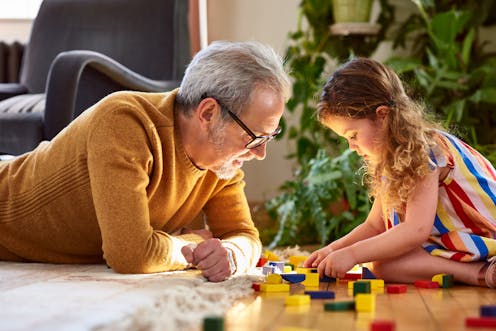Don't fret about buying the 'right' toy – any toy is educational if you support kids in their play
- Written by Nicola Yelland, Professor of Early Childhood Studies, The University of Melbourne

It’s that time of the year again, and besides the new COVID-era concerns about retail supply chains comes the age-old question: what’s the best educational toy to buy for the child (or grandchild) in your life?
There’s a vast range of toys that claim to stimulate learning, or foster creativity, or boost kids’ STEM skills. The US$94.7 billion global toy market[1] offers a bewildering amount of choice, while parenting blogs warn against “one and done” toys[2], Instagram influencers make us feel like we don’t measure up, and kids, being kids, pester us for whatever their friends have, or they’ve just seen on YouTube.
But here’s a simple truth: you know your child (and your budget) better than anyone. And here’s some reassuring advice: it doesn’t matter whether you choose a prescriptive toy such as a chemistry set or science kit, or an “open-ended” toy such as building blocks or plastic bricks. Any toy can be educational when you play with your children and talk to them about what they are doing and learning.
All you need to consider is what toys your child already has, what age they are, and what you think they would most enjoy playing with next.
Read more: From robots to board games, it's easy to do science this Christmas[3]
Favourite toys
Each year, the Museum of Play[4] in Rochester, New York, inducts toys into its hall of fame. This year, sand[5] was recognised, following in the illustrious footsteps of the stick, which was inducted in 2006.
The full list includes Cabbage Patch dolls, Battleship, Risk, The Settlers of Catan, Mahjong and billiards, as well as the piñata, American Girl Dolls, Masters of the Universe and the Fisher-Price Corn Popper. One of my personal favourites, Uno, made it in 2018, and of course Lego is there, having been added in 2015.
Lego is in fact a good place to start! The blocks are good for a wide age range, and you can either buy highly prescriptive kits that involve closely following a plan, or general sets containing random blocks for building something totally new and improvised. Or, if you prefer, you can buy various other types of blocks on the market, such as wooden or magnetic ones.
Regardless of the specific type, playing with blocks[7] encourages children to plan, construct and experiment with their engineering creations. And, crucially, they can learn even more if you help them along the way.
Parent power
While the children are playing with their blocks, parents or carers can play with them and engage them in conversation about the form and structure they are creating. Try using positional and relational language[8] to extend their vocabulary by posing questions such as:
do you think we can build this tower so it’s as high as the table?
how many blocks are around the base of this building?
what shape of blocks do we need to build a fence around this house? Or could we use other materials?
what are you going to put at the top of the structure?
Talking with your child while they are playing helps them articulate their ideas and build their vocabulary. It introduces them to mathematical concepts[9] such as numbers, space and measurement, and scientific processes such as observing, estimating, planning and problem-solving. It’s a wonderful chance to share ideas and talk with one another.
In a similar way, I am an advocate for games such as Uno and board games that involve meeting a goal, whether it be getting rid of all your cards, or racing around a board. This lets children experience winning and losing, and gives them a chance both to plan and strategise, and contend with chance elements such as the roll of a dice. Snakes and Ladders and Ludo both involve counting and numbers, and the element of chance. They can often inspire children to make up their own games as well.
Then, of course, there are toys[10] and materials[11] designed specifically to foster learning about STEM[12] (science, technology, engineering and mathematics). But these aren’t the only ways to boost these skills.
Read more: Five things parents can do every day to help develop STEM skills from a young age[13]
Being an effective STEM learner[14] is important and relevant to the modern world. STEM learning gives young children a chance to indulge their natural curiosity about the world around them, investigate concepts, use critical and creative thinking in systematic ways, and acquire skills and confidence.
This brings us back to the sticks and sand, and of course the box the toys arrived in, not to mention the packaging of any new appliances you might have bought yourself as a Christmas present!
The fact that kids so often end up playing with cardboard boxes – turning them into a cubby house, racing car or fortress – is testament to the fact anything can be a good toy with the right mindset. What really counts is the opportunity to play and talk with your child. This will equip them with knowledge, skills and confidence that will stand them in good stead at any age.
References
- ^ US$94.7 billion global toy market (www.statista.com)
- ^ “one and done” toys (www.pinterest.ca)
- ^ From robots to board games, it's easy to do science this Christmas (theconversation.com)
- ^ Museum of Play (www.museumofplay.org)
- ^ sand (www.museumofplay.org)
- ^ CC BY-SA (creativecommons.org)
- ^ playing with blocks (www.naeyc.org)
- ^ positional and relational language (www.amazon.com.au)
- ^ mathematical concepts (www.amazon.com.au)
- ^ toys (kidzinc.com.au)
- ^ materials (engino.com)
- ^ STEM (melscience.com)
- ^ Five things parents can do every day to help develop STEM skills from a young age (theconversation.com)
- ^ STEM learner (www.kiwico.com)

















